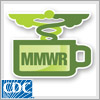A CUP OF HEALTH WITH CDC
Tourette Syndrome
Prevalence of Diagnosed Tourette Syndrome in Persons Aged 6-17 Years, by Parent Report – United States, 2007
June 4, 2009
[Announcer] This podcast is presented by the Centers for Disease Control and Prevention. CDC — safer, healthier people.
[Karen Hunter] Welcome to A Cup of Health with CDC, a weekly feature of the MMWR, the Morbidity and Mortality Weekly Report. I’m Karen Hunter, filling in for your host, Dr. Robert Gaynes.
Does your child have a persistent twitch or make sudden vocal outbursts? They could be symptoms of a condition known as Tourette Syndrome, or TS. TS is a neurologic disorder that begins in childhood and is characterized by involuntary, repetitive tics or twitches and random vocalizations.
Dr. Rebecca Bitsko is a researcher with CDC’s National Center for Birth Defects and Developmental Disabilities. She’s joining us today to discuss the childhood disorder known as Tourette Syndrome. Welcome to the show, Dr. Bitsko.
[Dr. Bitsko] Good morning. Thank you for having me.
[Karen Hunter] Dr. Bitsko, about how many children in the United States have been diagnosed with Tourette Syndrome?
[Dr. Bitsko] CDC found that in 2007 about 148,000 U.S. children were diagnosed with Tourette Syndrome; this about 3 in every 1,000 kids. However, we believe this is an underestimate, as a number of children with Tourette Syndrome are not diagnosed, so the number is probably quite a bit higher.
[Karen Hunter] Is Tourette Syndrome associated with any physical or mental disorders?
[Dr. Bitsko] Yes. In this study, we found that about 79 percent of children with Tourette Syndrome had another associated condition. The most common condition was attention deficit hyperactivity disorder, and other common conditions were behavioral conduct disorder, anxiety disorders, and depression.
[Karen Hunter] What are some common tics or vocalizations associated with this condition?
[Dr. Bitsko] Some common motor tics include eye blinking, neck jerking, or grimacing. Some common vocal tics are things like sniffing, coughing, or throat clearing.
[Karen Hunter] Now, why is early diagnosis for Tourette Syndrome so important?
[Dr. Bitsko] Early identification and diagnosis allows for the family to understand the child’s symptoms, and also, for the child to receive appropriate treatment, both for the Tourette Syndrome and for any other conditions the child might have. The child may also receive additional support in school which may help them to improve their academic performance.
[Karen Hunter] Dr. Bitsko, tell us about CDC’s partnership with the Tourette Syndrome Association?
[Dr. Bitsko] CDC sponsors efforts by the Tourette Syndrome Association to educate healthcare providers and school personnel about Tourette Syndrome to ensure earlier identification and promote appropriate medical, educational, and comprehensive behavioral interventions for children with TS, as well as co-occurring conditions.
[Karen Hunter] And where can listeners get more information about Tourette Syndrome?
[Dr. Bitsko] I can tell you about two websites. The CDC website: www.cdc.gov; if you go there and click on “T” in the A to Z list and select “Tourette Syndrome.” And also the Tourette Syndrome Association website, which is www.tsa-usa.org.
[Karen Hunter] Thanks, Dr. Bitsko. I’ve been talking today with CDC’s Dr. Rebecca Bitsko about the childhood disorder Tourette Syndrome.
Remember parents, if your child has involuntary, repetitive tics or twitches or random vocalizations, you might want to ask your healthcare provider about Tourette Syndrome. Although there is no cure, it can be treated and managed.
Until next time, be well. This is Karen Hunter for A Cup of Health with CDC.
[Announcer] For the most accurate health information, visit www.cdc.gov or call 1-800-CDC-INFO, 24/7.



